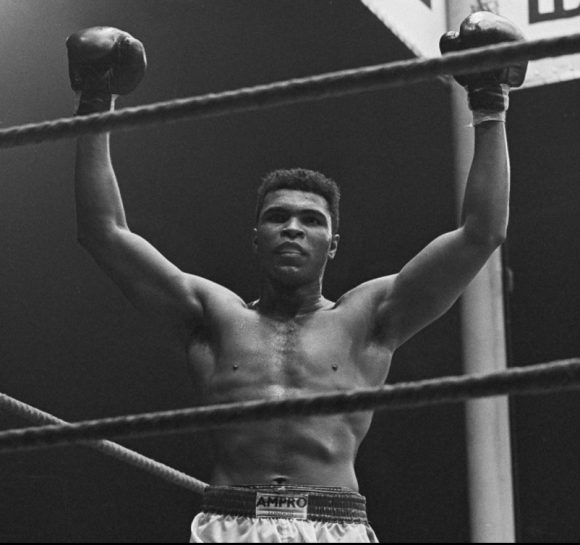Dear Commons Community.
Muhammad Ali, the greatest boxer of all time and civil rights champion, died yesterday at a Phoenix-area hospital, where he had spent the past few days being treated for respiratory complications. As reported by NBC News:
“After a 32-year battle with Parkinson’s disease, Muhammad Ali has passed away at the age of 74. The three-time World Heavyweight Champion boxer died this evening,” Bob Gunnell, a family spokesman, told NBC News.
Ali had suffered for three decades from Parkinson’s Disease, a progressive neurological condition that slowly robbed him of both his legendary verbal grace and his physical dexterity. A funeral service is planned in his hometown of Louisville, Kentucky.
Even as his health declined, Ali did not shy from politics or controversy, releasing a statement in December criticizing Republican presidential candidate Donald Trump’s proposal to ban Muslims from entering the United States. “We as Muslims have to stand up to those who use Islam to advance their own personal agenda,” he said.
The remark bookended the life of a man who burst into the national consciousness in the early 1960s, when as a young heavyweight champion he converted to Islam and refused to serve in the Vietnam War, and became an emblem of strength, eloquence, conscience and courage. Ali was an anti-establishment showman who transcended borders and barriers, race and religion. His fights against other men became spectacles, but he embodied much greater battles.
Born Cassius Clay on Jan. 17, 1942 in Louisville, Kentucky, to middle-class parents, Ali started boxing when he was 12, winning Golden Gloves titles before heading to the 1960 Olympics in Rome, where he won a gold medal as a light heavyweight.
He turned professional shortly afterward, supported at first by Louisville business owners who guaranteed him an unprecedented 50-50 split in earnings. His knack for talking up his own talents — often in verse — earned him the dismissive nickname “the Louisville Lip,” but he backed up his talk with action, relocating to Miami to train with the legendary trainer Angelo Dundee and build a case for getting a shot at the heavyweight title.
As his profile rose, Ali acted out against American racism. After he was refused services at a soda fountain counter, he said, he threw his Olympic gold medal into a river.
Recoiling from the sport’s tightly knit community of agents and promoters, Ali found guidance instead from the Nation of Islam, an American Muslim sect that advocated racial separation and rejected the pacifism of most civil rights activism. Inspired by Malcolm X, one of the group’s leaders, he converted in 1963. But he kept his new faith a secret until the crown was safely in hand.
That came the following year, when heavyweight champion Sonny Liston agreed to fight Ali. The challenger geared up for the bout with a litany of insults and rhymes, including the line, “float like a butterfly, sting like a bee.” He beat the fearsome Liston in a sixth-round technical knockout before a stunned Miami Beach crowd. In the ring, Ali proclaimed, “I am the greatest! I am the greatest! I’m the king of the world.”
The new champion soon renounced Cassius Clay as his “slave name” and said he would be known from then on as Muhammad Ali — bestowed by Nation of Islam founder Elijah Muhammad. He was 22 years old.
The move split sports fans and the broader American public: an American sports champion rejecting his birth name and adopting one that sounded subversive.
Ali successfully defended his title six times, including a rematch with Liston. Then, in 1967, at the height of the Vietnam War, Ali was drafted to serve in the U.S. Army.
He’d said previously that the war did not comport with his faith, and that he had “no quarrel” with America’s enemy, the Vietcong. He refused to serve.
“My conscience won’t let me go shoot my brother, or some darker people, some poor, hungry people in the mud, for big powerful America, and shoot them for what?” Ali said in an interview. “They never called me nigger. They never lynched me. They didn’t put no dogs on me.”
His stand culminated with an April appearance at an Army recruiting station, where he refused to step forward when his name was called. The reaction was swift and harsh. He was stripped of his boxing title, convicted of draft evasion and sentenced to five years in prison.
Released on appeal but unable to fight or leave the country, Ali turned to the lecture circuit, speaking on college campuses, where he engaged in heated debates, pointing out the hypocrisy of denying rights to blacks even as they were ordered to fight the country’s battles abroad.
“My enemy is the white people, not Vietcongs or Chinese or Japanese,” Ali told one white student who challenged his draft avoidance. “You my opposer when I want freedom. You my opposer when I want justice. You my opposer when I want equality. You won’t even stand up for me in America for my religious beliefs and you want me to go somewhere and fight but you won’t even stand up for me here at home.”
For those of who remember and were part of the 1960s civil rights and anti-war movements, Muhammad Ali was an important, controversial, and provocative figure. Boxing gave him fame but his stand on the Vietnam War and civil rights gave him his place in history. As the sportswriter Michael Powell commented:
“Courage is being 24 years old and risking all, the anger of newspaper and television reporters and millions of white Americans who see you as a public enemy, to say no to a war.”
Tony


